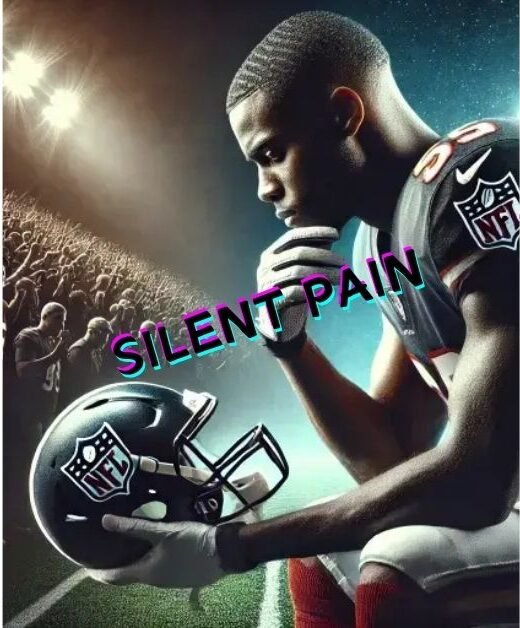NFL Mental Health: A Closer Look at Players’ Psychological Battles
Under each foul tackle and last-second play lies a debilitating mental blow: an invisible battle fought every day by NFL players. It is not just about risking it all physically but also “for better flow the excruciating pressure to excel, fear of injury, and relentless fan and media scrutiny. Every touchdown wins public applause; what about all those silent wars? What about emotional scars that do not carry any headlines? They aren’t just athletes; they are human beings who battle in ways that are seldom seen, with hidden mental health struggles, shedding light on NFL players’ mental health.
The Cost of Fame: Seau & Jackson’s Mental Health Battles
The starkly contrasting fates of Junior Seau and Vincent Jackson tell a captivating story about the hidden costs of fame. These two former football greats battled depression and anxiety through the later parts of their NFL careers and tragically lost their battle to these mental disorders. Their stories lead us to think of certain very painful realities: that the brightest stars could also be some of the most vulnerable. When the game ends and the cheers grow faint, we seem to celebrate victories; unfortunately, the emotional aftermath is rarely acknowledged.
NFL Mental Health: The Costly Impact of Depression and Anxiety
Among NFL players, mental health difficulties are not uncommon; on the contrary, they have gained alarming prevalence. About 24% of NFL players suffer from depression and 26% from anxiety. The pressure of sustained elite performance therefore imposes heavy costs. Even more shocking is the finding that with every five years in the NFL, the risk of depression increases by 9%. We admire their fortitude on the field but seldom recognize the suffering that follows them far from it.
NFL Football and Its Hidden Link to Depression
Julius Thomas: Mental Health Was Worth Walking Away For
Julius Thomas, the former tight end for the Denver Broncos, boasted four Pro Bowl selections, a trail of touchdowns, and rising fame. However, away from the spotlight, he faced a personal struggle. He chose to put the game behind him to heal himself not just physically but primarily spiritually. He is now on the verge of beginning a long road of recovery, which eerily resembles the saga of NBA star Kevin Love as he discussed his battles with anxiety and depression. Their stories show that even the toughest among the athletes deserve care, for the real strength is in choosing to walk away.
Video Credit: @FanDuelSportsNetworkOhio
Kevin Love on Mental Health and Panic Attacks
NFL Injuries: The Hidden Mental Struggles Behind the Physical Pain
There are injuries in the NFL, where one goes about broken bones and torn ligaments. But the crippling aftermath of an injury is equally agonizing. Take Alex Smith, for example. His leg injury was a physical nightmare, but he had to go through a mental agony. It was the uncertainty of whether he would ever put on his jersey again that troubled him so much. Recovery is not just a physical concern; it makes room for the mental side as well: overcoming fear and self-doubt, emotional exhaustion, and the sheer worry of whether the injury will improve. Some athletes would rather endure the physical aspect of a battle than the psychological one.
Video Credit : @TODAY
4 NFL Players Talk Mental Health with Carson Daly
Mental Toughness Is What Counts
In a league where physicality is often the measure, mental toughness becomes the differentiating factor. Players like Tom Brady and Russell Wilson excel in mental resilience; they concentrate, maintain discipline, and adopt an unwavering mindset to conquer any challenge that comes their way.Brady’s success involved much more than just talent; it was about shutting out anything that could lead to self-doubt and just keeping going. In the league, a player’s mind is their most powerful tool, not their physique.
Video Credit : @motiversity
Tom Brady’s Mental Toughness: The Power of Never Quitting
Helping Hands for Change: What Fans Can Do
As fans, we always have a job to do. We cheer the players in victory, but what do we do when they are down? Mental health is as much a matter for consideration as physical; consideration can really help. Either by texting a word of support or simply acknowledging their struggles, these are small acts that will go a long way in helping to break the stigma of mental health within sports.
Highlight Support Systems: Expert Outlook
Support systems for athletes struggling with mental health issues are important, according to sports psychologist Dr. Linda Carpenter. “Athletes need a safe space to express their fears—whether it’s about performance anxiety or injury recovery. The right support from family, friends, and professionals can make a difference.
Family and friends are important, too. Dak Prescott of the Dallas Cowboys has shared that his family helped him through his brother’s passing. NBA player DeMar DeRozan credits his loved ones for guiding, supporting, and uplifting him through depression. Their narratives emphasize the importance of speaking and getting help.
New Technology: Mental Health Monitoring of the Future
The technological breakthroughs are also changing mental health perspectives in the NFL. Some teams have begun to use artificial intelligence through helmet sensors that can measure stress and anxiety levels in real time. Such inventions can alter the landscape of care for players, making their mental wellness a concern alongside their physical health. That is, in fact, a step toward the future, where players no longer suffer in silence.
Video Credit : @TSN_Sports
Culture change in mental health of NFL Players
Interviews with Professionals: Understanding the Path to Healing
Dr. Gregory McDonald explains that although recovery is not linear, that does not mean one cannot succeed in recovery with help from a therapist and a strong support network. Brandon Marshall, a former NFL star and now an advocate for mental health, shared his story of how therapy helped him during his football career and after he retired. He now runs a foundation to assist athletes in speaking out about mental health issues without fear of judgment.
Video Credit: @GQSports
Brandon Marshall Silence Pain
Technological Advancements: Monitoring Mental Health in Real-Time
Mechanisms for enhancing mental care evolve simultaneously with advancements for mental challenges in the NFL. An increasingly relevant player-care technology, AI, now serves the real-time monitoring of mental well-being. Thanks to certain added sensors installed in the player’s helmet, teams can now capture signs of stress, anxiety, and perhaps concussion symptoms. All this tech actually holds the promise of a paradigm shift into an era in which mental health will be regarded with equal importance as physical health: the players are to be further empowered with their healing support, which encompasses not merely their bodies but also their mental state.
Bloggers Insights: Focusing on Our Own Reactions and NFL Players’ Mental Health Focus
As fans, we live through a flood of emotions when players face challenges or get injured. Sometimes, we empathize. Other times, however, relief floods our hearts—especially when the benefit to our teams is weighed against the cost of having an opposing player injured. Such dichotomous feelings are typical, and awareness gives us more compassion. The players are not just entertainers; they are human beings with real problems. The more that we understand that, the more we can push the culture of sports fandom toward one of support and understanding.
The Human Side of the Game: Conclusion
Behind every touchdown and tackle, NFL players are navigating personal battles that go beyond the game. It’s time to recognize their strength off the field as much as on it. The obstacles they navigate, both in their personal lives and on the field, deserve our understanding and respect. As fans, we can drive the conversation and prioritize mental health in sports. By acknowledging their humanity and offering our support, we can foster a culture rooted in empathy, resilience, and genuine care. When they push through adversity, they inspire us to do the same. It’s time we prioritize their mental well-being as much as we celebrate their victories on the field.




